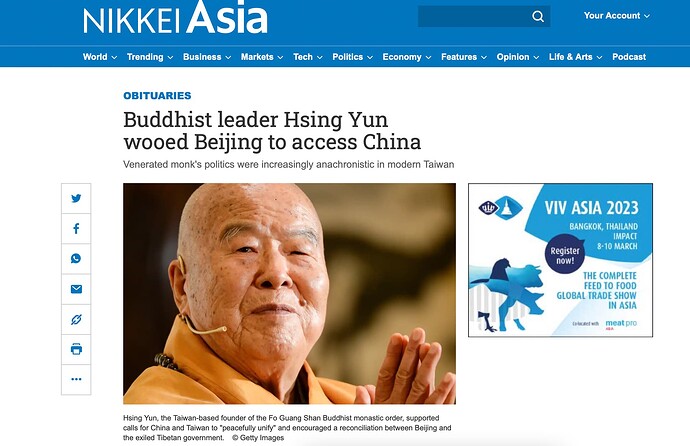-
星云是台湾著名的宗教领袖,他在全球范围内推广佛教,并创建了佛光山,这是华语世界中最有影响力的佛教机构之一。
-
在毛泽东领导的共产党政府几十年的反宗教运动之后,兴云希望在中国建立一个寺庙网络,并在中国推广佛教,这导致了他亲北京的观点。
-
他的亲北京观点和对台湾身份的否定引起了争议,因为北京声称台湾是它自己的领土。
-
星云改造和输出中国佛教,在五大洲建立了170多个佛光山分会,在全世界吸引了2000多名弟子和100多万信徒。
-
星云的人间佛教概念促使中国佛教的实践从以仪式为中心的异世界转变为通过修行佛法、促进佛教教育和社会福利来关注当下的生活。
-
虽然星云专注于发展他的佛教组织,但他似乎也同情许多人认为的中国破坏台湾主权的努力,这使他与台湾人民的大多数观点越来越不一致。
-
行云支持北京和国民党在 "一个中国 "下 "和平统一 "的呼吁,并与国民党保持密切联系,包括在该党的中央委员会任职。
-
星云的佛教奉献形式有助于降低台湾有争议的政治温度,强调需要和平解决台湾国内政治中的两极化问题。
-
星云大师的逝世让数十万虔诚的信徒为他们尊敬的宗教领袖默哀,也让中国失去了一个强大的宣传工具。
-
北京提议派代表团参加行云的葬礼,导致与台湾发生争执,中国代表团最终抵制了这次葬礼。
-
Hsing Yun was a prominent religious leader in Taiwan who promoted Buddhism globally and founded Fo Guang Shan, one of the most influential Buddhist institutions in the Chinese-speaking world.
-
Hsing Yun had a desire to build a network of temples in China and promote Buddhism there after decades of anti-religion campaigns by the Communist government under Mao Zedong, leading to his pro-Beijing views.
-
He courted controversy with his pro-Beijing views and dismissal of the Taiwanese identity, as Beijing claims Taiwan as its own territory.
-
Hsing Yun transformed and exported Chinese Buddhism and established over 170 Fo Guang Shan chapters on five continents, attracting more than 2,000 disciples and over a million devotees around the world.
-
Hsing Yun’s concept of humanistic Buddhism contributed to a shift in Chinese Buddhist practices from one that was ritual-centered and otherworldly to one that focused on the here-and-now through the practice of the Dharma and the promotion of Buddhist education and social welfare.
-
While Hsing Yun focused on growing his Buddhist organization, he also seemed to sympathize with what many saw as China’s efforts to undermine Taiwan’s sovereignty, putting him increasingly at odds with the majority view among the people of Taiwan.
-
Hsing Yun supported calls by both Beijing and the KMT for “peaceful unification” under “One China,” and was closely associated with the KMT, including serving on the party’s central committee.
-
Hsing Yun’s form of Buddhist devotion helped lower the temperature of Taiwan’s contentious politics, stressing the need for a peaceful resolution of polarizing issues in Taiwan’s domestic politics.
-
Hsing Yun’s death leaves hundreds of thousands of devoted followers mourning their revered religious leader and deprives China of a powerful propaganda tool.
-
Beijing’s proposal to send a delegation to Hsing Yun’s funeral led to a row with Taiwan, and the Chinese delegation ultimately boycotted the funeral.
链接:Buddhist leader Hsing Yun wooed Beijing to access China - Nikkei Asia
